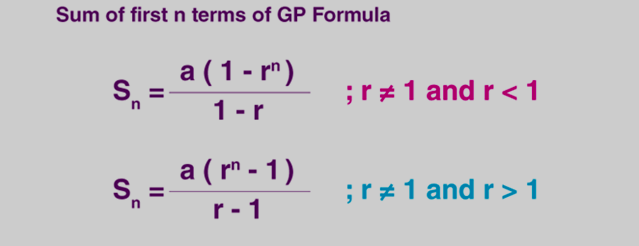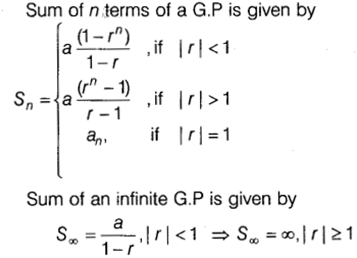
Sum to n Terms To A GP Formula: A Geometric Progression (GP) is a numerical sequence in which each term is derived by multiplying the preceding term by a constant factor known as the common ratio (r).There are two cases for GPs: finite GPs, where there is a specific number of terms (n), and infinite GPs, which continue indefinitely.
Also Check - Introduction to Graph FormulaFormulas for Sum of GP
Finite GP Sum Formula
For a finite GP with the first term (a), common ratio (r), and n terms, the sum (Sn) can be calculated using the formula:
Sn = a[(r^n - 1) / (r - 1)] (if r ≠ 1)
Where:
a is the first term
r is the common ratio
n is the number of terms

Infinite GP Sum Formula
If the common ratio (r) is equal to 1 in an infinite GP, the sum (Sn) of the first n terms is simply:
Sn = na
Proofs for GP Sum Formulas
Proof 1: Finite GP Sum Formula
For a finite GP with a common ratio (r ≠ 1), we can prove the sum formula as follows:
Consider the first n terms of the GP: a, ar, ar^2, ar^3, …, ar^(n-1).
Define Sn as the summation of these terms: Sn = a + ar + ar^2 + ar^3 + … + ar^(n-1).
Now, multiply both sides of the equation by r: rSn = ar + ar^2 + ar^3 + ar^4 + … + ar^n.
Next, subtract the original equation from the above: rSn - Sn = ar^n - a.
Factor out Sn on the left side: (r - 1)Sn = a(r^n - 1).
Finally, divide both sides by (r - 1) to derive the formula.
Sn = a(r^n - 1)/ (r - 1)
 Also Check -
Logarithm Formula
Also Check -
Logarithm Formula
Proof 2: Infinite GP Sum Formula
For an infinite GP, if the common ratio is 1, we can easily derive the formula as shown earlier.
Sum of Infinite GP
Let's examine an infinite geometric progression represented as a, ar, ar^2, ar^3, and so on, where 'a' is the initial term, 'r' is the common ratio, and the final term remains undefined.
In this context, we can represent the sum of an infinite geometric progression using the subsequent formula:

The sum of an infinite GP depends on the value of the common ratio (r):
When |r| < 1, the geometric series converges, and it has a finite sum.
If |r| > 1, the geometric series diverges and has no sum.
Also Check- Data Handling FormulaSolved Examples
Example 1:
Calculate the sum of the first n terms in the geometric progression, given a = 1 and r = 2/3 (where r is less than 1).
Solution:
Using the finite GP sum formula:
Sn = (1 * [(2/3)^n - 1]) / (2/3 - 1)
Simplify to find the sum.
Example 2:
Determine the total of the first 6 terms in a geometric progression (GP) with an initial term of 2 and a constant ratio of 4.
Solution:
Given: a = 2, r = 4, n = 6
Use the formula for a finite GP when r > 1 to calculate Sn.
Example 3:
Find the sum of the infinite GP: 125, 25, 5, ….
Solution:
Given: a = 125, r = 1/5 (r < 1)
Use the infinite GP sum formula for r < 1 to calculate Sn.
Example 4:
Discover the sum of the first 5 terms in a geometric progression (GP) with an initial term of 3 and a common ratio of 2.
Solution:
Given: a = 3, r = 2, n = 5
Using the finite GP sum formula when r > 1:
Sn = (3 * [(2^5 - 1]) / (2 - 1)
Calculate the sum.
Example 5:
Calculate the sum of the first 8 terms of an infinite GP with a first term of 4 and a common ratio of 1/3.
Solution:
Given: a = 4, r = 1/3 (r < 1)
Use the infinite GP sum formula for r < 1 to calculate Sn.
Example 6:
Calculate the sum of the first 10 terms in a geometric progression (GP) with an initial term of 5 and a constant ratio of -1/2.
Solution:
Given: a = 5, r = -1/2, n = 10
Using the finite GP sum formula when r ≠ 1:
Sn = (5 * [(-1/2)^10 - 1]) / (-1/2 - 1)
Calculate the sum.
Example 7:
Determine the total of the first 12 terms in an infinite geometric progression (GP) with an initial term of 6 and a constant ratio of 1/4.
Solution:
Given: a = 6, r = 1/4 (r < 1)
Use the infinite GP sum formula for r < 1 to calculate Sn.
Example 8:
Calculate the sum of the first 7 terms in a geometric progression (GP) with a starting value of 10 and a constant ratio of 0.5.
Solution:
Given: a = 10, r = 0.5, n = 7
Using the finite GP sum formula when r ≠ 1:
Sn = (10 * [(0.5^7 - 1]) / (0.5 - 1)
Calculate the sum.
Sum to n Terms To A GP Formula FAQs
What is a Geometric Progression (GP)?
How is th How is the sum of a finite GP calculated?e sum of a finite GP calculated?
What is the formula for the sum of an infinite GP with |r| < 1?
How do you find the sum of a GP when the common ratio is 1?










